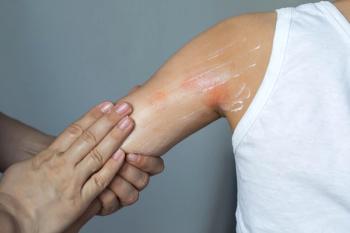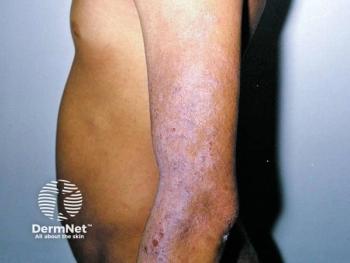
Topicals retain key role in psoriasis management
Maintaining patient compliance is critical in effectiveness of this form of treatment
New York - Topical modalities remain a mainstay for the management of psoriasis, but achieving good outcomes with their use requires attention to compliance-enabling-strategies, said Steven R. Feldman, M.D., Ph.D., at the American Academy of Dermatology Academy '04 here recently.
"Despite all of the excitement about the new biologics for treatment of psoriasis, topical agents continue to play a key role. After all, 80 percent of patients have only localized disease and are not candidates for systemic therapy, and even those who are, still need topical treatment for resistant patches," comments Dr. Feldman, professor of dermatology, pathology and public health sciences, and director, Psoriasis Treatment Center, Wake Forest University School of Medicine, Winston-Salem, N.C.
With respect to the former, encouraging patients to join the National Psoriasis Foundation can be very helpful. Not only does the organization benefit its members by educating and empowering them, but it also supports physician efforts in patient care by encouraging patient adherence to medical advice, explains Dr. Feldman.
In picking specific modalities, attention to the vehicle is important. It is a primary determinant of compliance.
"Patients will not use a treatment they don't like, and results of a focus group survey we conducted showed that whether asked about daytime or nighttime treatment, patients preferred less messy foam and solution-based products over traditional gels, ointments, creams and emollients," says Dr. Feldman.
He adds that therapeutic resistance of scalp psoriasis is likely a pure compliance issue, and that foams and a new shampoo formulation of clobetasol (Clobex, Galderma) may be helpful in achieving clearing of scalp disease.
"Scalp psoriasis responds to topical medications in clinical trials, which indicates that if we can get patients to use their medication, it should work," says Dr. Feldman.
Corticosteroids Potent corticosteroids continue to be the No. 1 topical agent used by dermatologists and non-dermatologists for the treatment of psoriasis, and while corticosteroids can be as effective as monotherapy, a dual approach with concomitant use of a nonsteroidal agent, such as calcipotriene (Dovonex, LEO Pharma) or tazarotene (Tazorac, Allergan), is valuable for improving both efficacy and safety.
"Topical calcipotriene and tazarotene are helpful in psoriasis management, but used alone, they work slowly and are irritating. So ignore the PDR and don't prescribe them as monotherapy," adds Dr. Feldman.
Consider compatibility However, when prescribing combination therapy, it is also important to consider drug-to-drug interactions.
In that regard, Dr. Feldman notes there are data to show that calcipotriene is compatible with halobetasol propionate ointment (Ultravate, Westwood, Squibb) and clobetasol propionate foam (Olux, Connetics). While stability is likely not an issue with other corticosteroids, that remains to be proven in formal studies.
Results from European clinical trials also show that the fixed combination of calcipotriene and betamethasone (Dovobet, LEO Pharma) is highly effective for treatment of localized psoriasis. That experience speaks to the benefit of dual therapy with that specific combination, but also to the importance of compliance, says Dr. Feldman.
"Patients may adhere better to their treatment regimen when having to apply only a single topical agent, but the efficacy that has been achieved with that fixed combination product suggests that if we can get our patients to use both agents together, we can expect them to really get better," he notes.
Newsletter
Like what you’re reading? Subscribe to Dermatology Times for weekly updates on therapies, innovations, and real-world practice tips.












